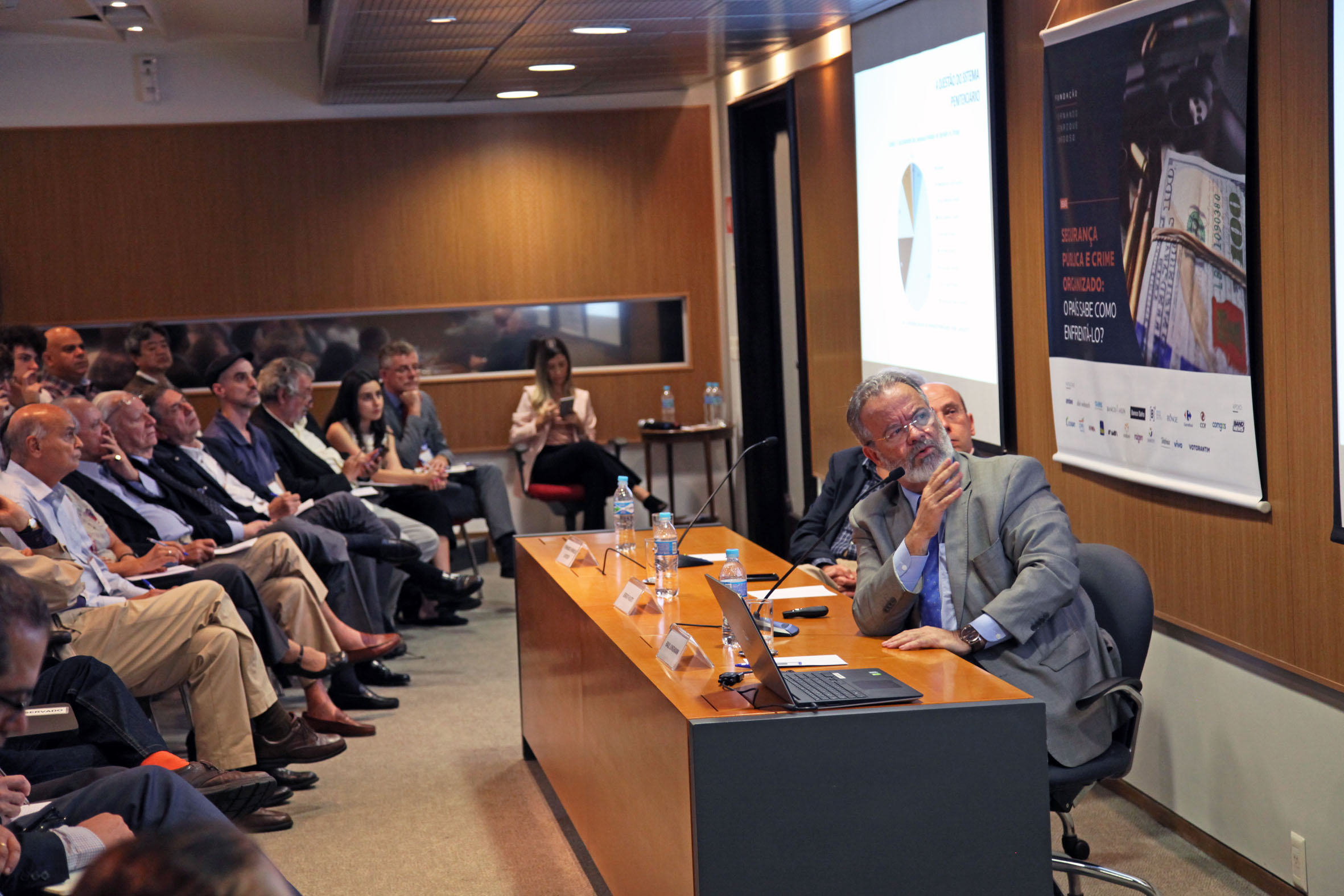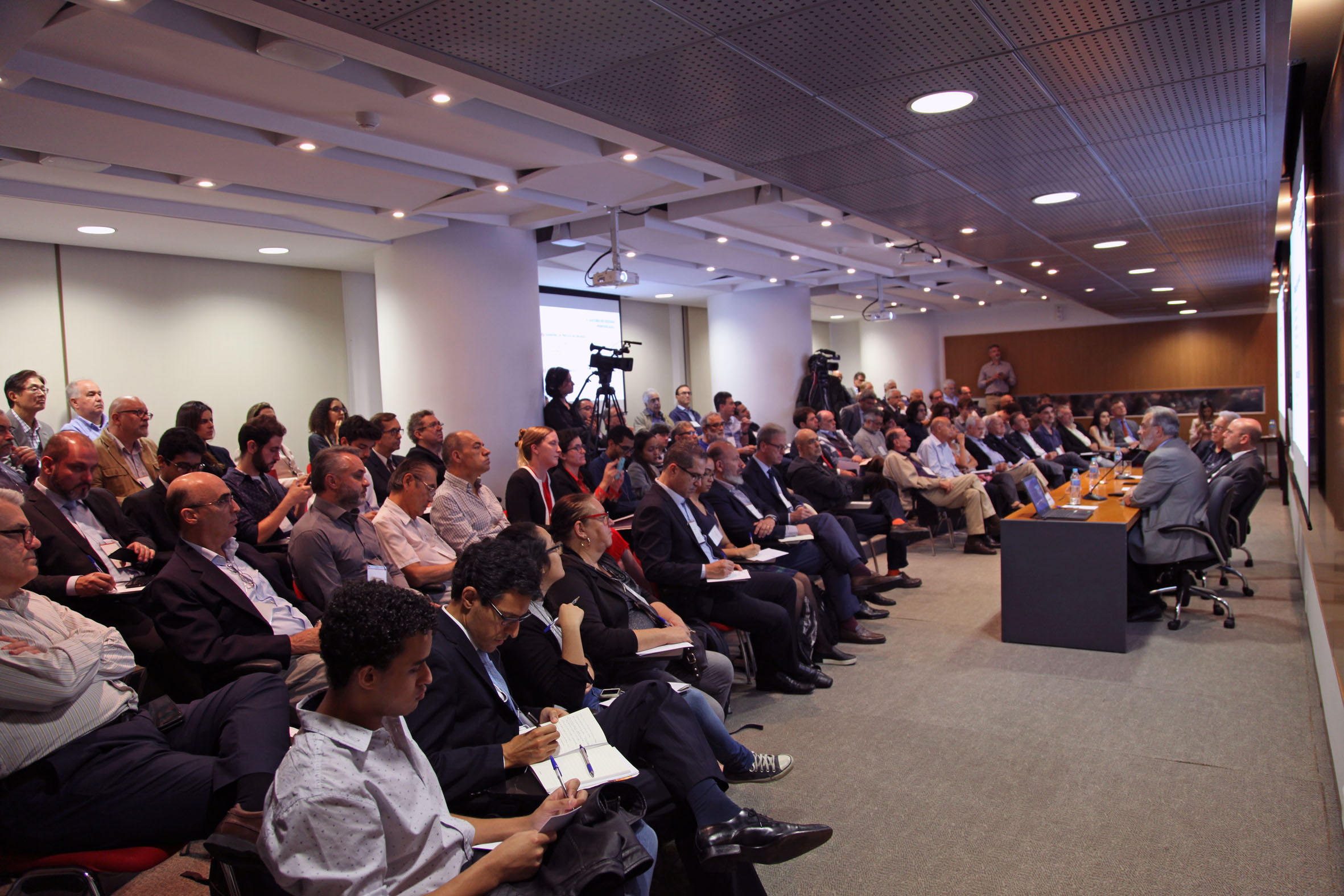Public Safety and Organized Crime: Does the Country Know How to Face It?
Brazil is experiencing “acephalous federalism” in public safety, with the historical absence of a national strategy to tackle crime, especially organized crime, which dominates the Brazilian penitentiary system and operates from within it. About 70 criminal organizations operate in prisons and have an army of imprisoned youth at their disposal, which they easily entice and only increases each year, feeding the cycle of violence.
“Objectively speaking, the country is a partner of the organized crime, because although it has a prison system, it is the criminal organizations who control the prisons. Everyone knows that, but nobody acts to change that reality.”
Raul Jungmann, Former Special Minister of Public Safety (2018-2019)
In a lecture at the Fernando Henrique Cardoso Foundation, former Minister of Defense (2016-2018) and former Special Minister of Public Safety (2018-2019) Raul Jungmann, described the scenario above. He presented a large amount of data showing that it is unsustainable to deal with crime in the same way as it is done today in Brazil (see full presentation in the Related Content section, on the right of this page).
“We have drafted a public safety plan for the next ten years that, if implemented, will be the first time that the country is responsible for setting the course for combating violence at the national level, working together with states and cities and with well-defined goals. Also, all states must produce data, which will be gathered in an annual report and delivered to Congress,” he said.

According to the speaker, during the ten months he was in charge of the Special Ministry of Public Safety–created by former President Michel Temer in February 2018 and merged with the Ministry of Justice at the beginning of Bolsonaro’s administration–, there were important institutional advances:
- Structuring of the Unified Public Safety System – SUSP
- Creation of the National Council of Public Safety
- Creation of the National Public Safety Policy
- Definition of Permanent Resources for Public Safety
- Creation of the National Program for Ex-Convicts
Among the figures presented, one drew special attention: the economic costs of crime in Brazil (including spending on public and private security, prisons, insurance, and material and productive capacity losses) reached 300 billion BRL in 2014, and slightly less than that in the following year.
‘Current model is not sustainable’
The incarcerated population grew 8.3% per year in the last five years. At this rate, the number of prisoners will double by 2025, going from the current 777,000 (3rd largest in the world) to 1.47 million. The gravity of the situation becomes even more apparent when we consider that the country currently has a deficit of 360,000 vacancies in the prison system (there are only 370,000 vacancies available) and 580,000 outstanding arrest warrants.
Clearing the deficit would require the immediate construction of an additional 460 prison units across the country; however, to account for the expected increase in the prison population by 2025, it would require another 1,290 units at 62 billion BRL. “This course of action is not sustainable in any way,” said Jungmann, who is currently an advisory member of the National Justice Council.
Historical omission
“From the 1st to the 7th Brazilian Constitution, promulgated in 1988, public safety was never within the purview of the central government. The consequences of this historical omission are far-reaching and profound, as demonstrated by the fact that we do not even have official crime statistics at the national level. How is it possible to create public policy without data?” said Raul Jungmann.
According to the former minister, given the lack of constitutional competence of the country in the area of public safety, states don’t feel obliged to share information with the federal government or even among themselves. “Good thing we have NGOs like the Public Safety Forum, Sou da Paz, and other ones, that have been shedding light on the problem for many years,” he said.

Public safety and inequality
“Young men aged 15-24 who live on the impoverished outskirts of cities, have low incomes and low levels of education and kill and die two times more than the national average. They also end up in prisons, where they are forced to join a criminal organization. Whoever does not undergo the initiation ritual dies. ” Raul Jungmann
Statistics show that Brazil’s persistent inequality is dramatically present in public safety: 55% of Brazilians deprived of their liberty are 29 years old or younger, most are afro-descendent and grew up in broken families in the impoverished outskirts of big cities.
Among prisoners, 89% did not complete basic education, which comprises the stages of primary education and lower secondary education, and only 1% reached higher education (but not all of those completed it); 292,000 people (42% of the total) are detained without conviction, and only 12% (75,000 of the 777,000) have access to any kind of education while in prison. The percentage of prisoners who have work is even smaller (15%).
“Violence moves from the poorer areas to the prisons and vice versa. That is the reality, indeed. However, has a president, governor, senator or representative been recently elected proposing changes to the prison system? Anyone who dares to do so will be massacred by public opinion,” criticized the former minister, for whom the justice system is bankrupt.
“Our justice is punitive, but it does not fulfill its mission to re-socialize those in prison. Young people leave prisons stigmatized, uneducated, and without professional qualifications and, as a result, the level of recidivism in crime is up to 70%,” he said.
5 actions
According to the speaker, the available statistics show that 50% of homicides occur in about 130 Brazilian cities, and it is in that universe that authorities at the three levels of government should primarily act. “We already know which groups are most vulnerable and where they are. The focus should be on the most vulnerable youth (to be reached) through an articulated policy that includes quality education, well-fare, sports, vocational training, employment, and, of course, police working closely with the community. That’s a beautiful public safety policy,” he said.
The former Minister of Public Safety prioritized 5 actions:
- Implementation of the Unified Public Safety System (SUSP) and the National Public Safety Policy;
- Creation of social prevention programs for youth in the most vulnerable territories: “Either we can design programs that reach the most vulnerable youth, or there is no solution to violence and crime”;
- Review of the Drug Control Policy: “Drug control legislation does not define who is a drug dealer and who is just a drug user and should receive treatment rather than go to prison”;
- Review of the justice and prison systems, with the digitization of processes and adoption of alternative penalties whenever possible to reduce incarceration;
- New police model: non-political, non-corrupt, and focused on evidence, intelligence, and integration.
Lottery funds will finance the new SUSP, going from the 800 million BRL earmarked in 2018 to the 4.3 billion BRL earmarked in 2022. At least half of that amount will go to the states, which, in turn, will sign collaborative management agreements. The Brazilian Development Bank (BNDES) statute was also amended so that the public bank could operate in public safety through a fund of 42 billion BRL for states and municipalities to invest in safety products and conventions for the construction of prisons.
“It is not impossible to reduce violence and defeat organized crime based on rationality. Otherwise, we will pay an ever-higher price for the loss of life, especially the young, and jeopardize the fundamental achievements of recent decades such as democracy, the rule of law, the protection of human rights, and the fight against social inequality,” concluded the speaker.
“In his presentation today, Minister Jungmann gave concrete expression to a severe problem that we have not yet had the courage to face in all its complexity. Repressing alone does not work. The origins of the problem must be firmly prevented and attacked, articulated between the three powers and the three levels of government, with the participation of the whole society. It is past time for us to do that,” said former president Fernando Henrique Cardoso at the end of the presentation.
Otávio Dias is a journalist who specializes in politics and international affairs. A former correspondent of Folha de S. Paulo in London and editor of the news website estadao.com.br, he is currently the content editor at the Fernando Henrique Cardoso Foundation.
Portuguese to English translation by Melissa Harkin & Todd Harkin (Harkin Translations).




